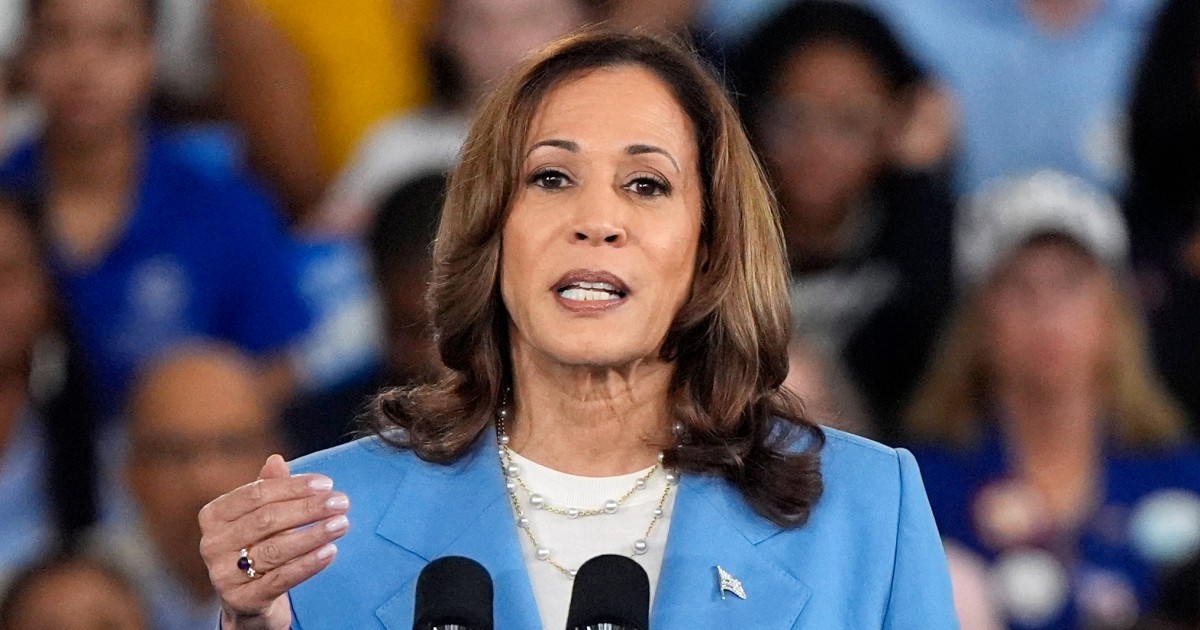The vice president is rolling out her first revenue-raising policy proposal as the Democratic presidential nominee and drawing a contrast with GOP opponent Donald Trump.
Vice President Kamala Harris is calling for raising the corporate tax rate to 28%, her first major proposal to raise revenues and finance expensive plans she wants to pursue as president.
Harris campaign spokesman James Singer told NBC News that she would push for a 28% corporate tax rate, calling it “a fiscally responsible way to put money back in the pockets of working people and ensure billionaires and big corporations pay their fair share.”
…
If enacted, the policy would raise hundreds of billions of dollars, as the nonpartisan Congressional Budget Office has projected that 1 percentage point increases in the corporate rate corresponds to about $100 billion over a decade. It would also roll back a big part of former President Donald Trump’s signature legislation in 2017 as president, which slashed the corporate tax rate from 35% to 21%.
Trump, meanwhile, recently said he would cut taxes even further if elected president, including on businesses.



The top 1 percent of earners alone pay over one-third of income taxes.
Accounting for all forms of taxation, they pay roughly 25%.
Corporations “pay nearly no taxes” is just categorically false. Language matters - some companies avoid paying federal income tax. In these cases, chances are it had a combination of both zero or negative book income and either net operating losses, significant foreign profits, sizable capital investments, or all of the above.
Of course, it’s also important to remember that federal income taxes aren’t the only taxes corporations pay. Businesses are also liable for state income taxes, payroll taxes, property taxes, and excise taxes, of which are almost entirely unavoidable.
Empirical studies show that workers (i.e., labor) bear more than 50 percent of the burden of the corporate income tax. How is it possible that workers bear the brunt of a tax they don’t even pay? The key lies in the difference between “legal” tax incidence—who is legally obligated to pay a tax—and what economists call “economic” tax incidence—who indirectly pays for a tax, often in the form of lower wages.
The higher business taxes are, the higher the cost of investing is and the less likely businsess owners are to invest in things like equipment, buildings, and trainings that will make their staff more productive. And the less productive workers are, the less their employers can afford to pay them in the long run.
Instead, maybe we look at limiting a companies ability to offshore profits, limit incentives for stock buyback, and adjust how deductions for stock options work.
Crazy idea, how about we make it easier to pay taxes so companies don’t feel the need to cheat. What if we make it so it’s cheaper to pay federal taxes than it is to avoid them.
I’m with you if we also include penalties for avoiding taxes. Carrot and stick.
The top 1% have approximately 1/3 to 1/4 of the total wealth of the country. So this tax rate sounds fair. Probably should pay a little more to account for the progressive nature of taxes.
Personally, I’d like to see more inheritance taxes. We shouldn’t have a class of nobility.
Also lift the cap on social security taxes.
If they own 30% of the wealth they should be paying far more than 30% of taxes. After taxes and the cost of living comfortably, they are steadily increasing the wealth disparity and benefiting from a society where they are exploiting the lower classes, especially considering that a sizable number of people in the full-time working lower classes are not ever able to reach a level of basic comfort and security, as a direct result of them hoarding not just wealth but power, and not paying “their fair share” of either.
That’s a good point. Perhaps I should say “much more” instead of “a little bit more”